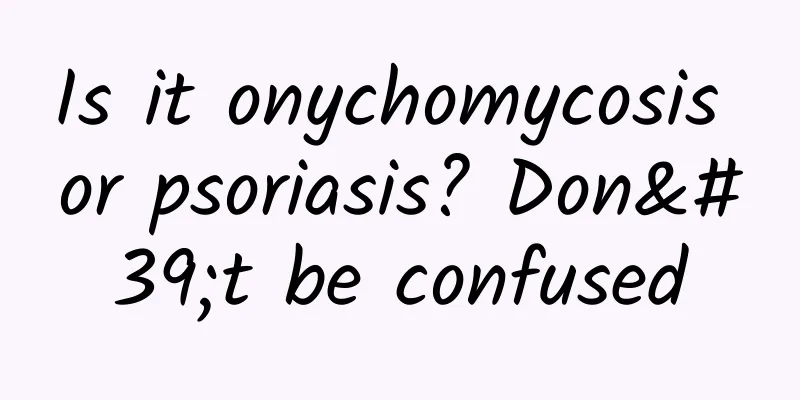Is it onychomycosis or psoriasis? Don't be confused

|
Author: Tang Qin, Deputy Secretary-General of the Science Popularization Expert Committee of the Chinese Medical Association Reviewer: Zhang Shuyuan, Chief Physician, Beijing Huayi Integrated Traditional Chinese and Western Medicine Dermatology Hospital Xiao Wang found that his nails had changed color and were growing thicker and thicker. He suspected that he had onychomycosis, but after going to the hospital for treatment, he found that he did not have onychomycosis but nail damage caused by psoriasis. Figure 1 Copyright image, no permission to reprint 1. Psoriasis and Psoriatic Nail Lesions Psoriasis is an immune-mediated disease caused by multiple factors, the main causes of which are genetic, environmental and immune factors. Psoriasis can occur in any age group and there is no obvious gender difference. Clinically, most patients will experience relapse or worsening of the disease in winter. The more typical symptoms are localized or widespread scaly erythema or plaques. Skin lesions caused by psoriasis generally appear all over the patient's body, and the nails are the most easily affected area in most psoriasis patients, leading to the formation of psoriatic nail lesions [1]. 2. Easily confused psoriasis nail lesions and onychomycosis Normal nails are mostly translucent, with a relatively smooth and neat surface, appear pink, and have a certain curvature. But psoriasis can cause nail abnormalities, with tiny pinprick-like depressions on the nails, similar to thimbles, and discoloration, thickening, or separation of the nail plate from the nail bed. The main symptoms of onychomycosis are also nail deformation, thickening, turbidity, separation, discoloration, loss of luster and uneven surface of the nail plate. In severe cases, the nail plate is completely detached from the base. Therefore, many people cannot easily distinguish between the two. Some psoriasis patients even treat the nail lesions caused by psoriasis as onychomycosis. This not only fails to cure the nail lesions, but makes their condition worse. Therefore, it is very important to understand the difference between psoriatic nail lesions and onychomycosis. Figure 2 Copyright image, no permission to reprint 3. The obvious difference between psoriasis nail lesions and onychomycosis Psoriatic nail lesions mainly occur in patients with psoriasis and do not appear only in the form of nail lesions; while the lesions caused by onychomycosis are mainly concentrated on the patient's nails, and one or more nails may be affected. In addition, there are three differences between psoriasis and onychomycosis: 1. Different sites of disease When psoriasis patients develop nail lesions, psoriasis-related symptoms usually appear in other parts of the body. Nail lesions caused by psoriasis usually appear on both hands at the same time, and the number of affected nails is not equal, and the severity of the disease is also different. However, onychomycosis and psoriasis nail lesions are different. The main concentrated area of the lesions is the nails, usually starting with 1 to 2 nails, starting from the edge of the nail. In severe cases, all nails may be affected. 2. Different clinical manifestations When psoriasis patients develop nail lesions, some small depressions like those pricked by needles will first appear on the nails, and the nail plate may also change color, thicken, or separate from the nail bed. Onychomycosis patients will have longitudinal white stripes on the nail plate. These stripes will pass through the arc shadow of the patient's nail plate, and then the white color will disappear, turning into dark stripes with longitudinal ridges. The nail plate will become brittle and very easy to crack. The stripes may appear as "V"-shaped notches at the free edge of the nail, sometimes accompanied by thickening under the distal nail. 3. Different infectiousness Psoriasis patients do not need to worry about the infectiousness issue as the fungal test results are negative; however, onychomycosis is caused by fungal infection and is somewhat contagious. Knowing the difference between psoriatic nail lesions and onychomycosis, we should pay attention to distinguishing the two in our daily lives, and not treat psoriatic nail lesions as onychomycosis. If the nails are abnormal, do not blindly take medicine on your own, but go to the hospital for diagnosis and treatment in time to determine whether it is psoriatic nail lesions or onychomycosis, and use symptomatic treatment to reduce the damage. References [1] Chinese Medical Association, Chinese Medical Association Journal, Chinese Society of Dermatology and Venereology, et al. Guidelines for diagnosis and treatment of psoriasis at the primary level (2022)[J]. Chinese Journal of General Practitioners, 2022, 21(8):705-714. |
<<: invodo: Research shows that users like shopping videos and they are more effective
>>: Piper Jaffray: Survey shows 40% of American teenagers own iPhones
Recommend
Can you really lose weight during your period?
Women's metabolism is faster during menstruat...
What to eat during pregnancy to avoid spots
Every woman experiences different pregnancy react...
Can pregnant women eat cucumbers? Will it affect the fetus?
In daily life, loofah is a very common vegetable....
What to do if you get angry after the holidays? Chinese medicine gives advice!
After the Spring Festival, many outpatient patien...
What to do if one breast is obviously bigger than the other during lactation
Exclusive breastfeeding can be said to be the mos...
I took diet pills within one month of pregnancy.
In the early stages of pregnancy, the body of the...
Heartburn in early pregnancy
In the early stages of pregnancy, if heartburn oc...
Diet therapy makes women healthier
1. Drink red wine to prevent and treat breast can...
What is the cause of uterine contractions in 35 weeks of pregnancy?
A normal woman's pregnancy is mature after 40...
Can I take X-rays while breastfeeding?
Some new mothers fall ill during breastfeeding, b...
There are several types of girls' personalities
Every girl has a different personality. Girls sho...
What causes uterine effusion?
Uterine effusion is a relatively common gynecolog...
Can I get the HPV vaccine while breastfeeding?
Experts say that it is not suitable for pregnant ...
Which meat is best for twice-cooked pork?
We all know that there are many ways to eat pork,...









